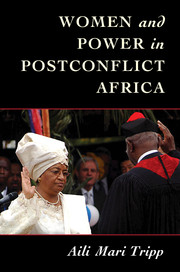Preface
Published online by Cambridge University Press: 05 November 2015
Summary
When I went to Uganda in 1992 to carry out research, I was interested in why Uganda, which had just come out of years of major conflict, had so many women in top government positions and why the country had the highest rates of representation of women in parliament in Africa at the time. What I did not know then – and could not have known – was that this was the beginning of a pattern that became especially evident after 2000: that postconflict countries had higher rates of female representation in politics, and that they were making more women's rights reforms in their constitutions and legislation compared with non-postconflict countries. In my 2000 book, Women and Politics in Uganda, I attributed the changes to shifts in gender relations during the war, but primarily to the emergence of autonomous women's organizations, supported by international donors. Subsequently, fifteen other countries have emerged from major conflict, exhibiting similar patterns.
This book shows how the trends I noticed in Uganda in the early 1990s are now evident in other parts of Africa. It asks two main questions: What accounts for this somewhat curious by-product of war that has resulted in higher political leadership rates for women and more constitutional and legislative changes regarding women's rights in postconflict countries? This book also asks: How were postconflict countries able, in a relatively short span of time, to advance women's status in key areas and in some of the most challenging areas for women? They not only accomplished what the Nordic countries had done over the course of 100 years in increasing legislative representation, but, in some cases, exceeded their rates almost overnight. Moreover, the changes were not simply in the area of politics, they extended into multiple arenas.
What happened in Uganda and in many other postconflict states was a major shift in social and gender relations and in the gender regime, to borrow a concept developed by Raewyn Connell. The changes have been far from linear and are, in fact, quite uneven and messy. To activists in these countries, the changes have been all too slow and halting, but even the impatience with the slowness in the pace of change is an indication of the way in which expectations have been transformed. In nondemocratic countries, the changes are compromised by a lack of political rights and civil liberties.
- Type
- Chapter
- Information
- Women and Power in Postconflict Africa , pp. xxi - xxviPublisher: Cambridge University PressPrint publication year: 2015

